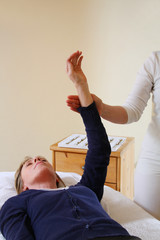In today’s world, being healthy means knowing how our bodies react to what we eat. This is where Nutrition Response Therapy helps. It offers a special way to improve health and wellness. Instead of just treating the symptoms, it looks for the root problems and works to fix them through a personalized health improvement program that includes nutritional supplements. It understands that each person has a unique “nutrition response.” This helps lead to long-lasting wellness.
The Development of Nutrition Response Testing
Dr. Freddie Ulan is well-known in natural health and as the leader of Nutrition Response Testing. Dr. Ulan personally faced health problems and wanted to find solutions beyond conventional medicine. His search led to a system that finds the root causes of health imbalances and underlying issues and also offered a way to achieve lasting wellness. Decades of clinical experience of healthcare workers and researchers helped develop this therapy. Over the years, they have carefully tracked results have shown that NRT is effective and improved how this therapy works.
NRT mixes ancient methods with modern science to make a strong system for understanding and solving health issues and underlying deficiencies. The evolution of NRT shows a new trend in healthcare towards holistic approaches. These views see the body as a connected system. Unlike traditional medicine, which often looks at single symptoms, this therapy focuses on how different body systems work together. Through analysis of the body, it aims to find the root causes of illness.
At its core, this evolution understands that real wellness goes beyond just not being sick. It means being fully well in body, mind, and emotions. Today’s NRT providers are not just doctors. They guide people to make better health choices.
This new practice understands that the body can heal itself with the right support and tools. By fixing nutritional deficiencies and removing barriers to optimal health, NRT helps the body heal naturally.
How Does Nutrition Response Testing Work?
Nutrition Response Testing is a non-invasive system that analyzes the body’s reflexes and acupuncture points to determine the underlying causes of health issues. It aims to identify imbalances in the body and recommend personalized nutritional protocols to restore health and well-being.
Think of your body as a special instrument. It can show what it needs through different signals. By using a method called muscle testing, the practitioner can find “weak areas” in your body. These spots relate to specific organs or systems. The weak areas can show potential stressors that might be affecting your health. Among numerous others, this can include problems like nutritional deficiencies or toxins in the environment.
This method is based on the belief that stressors, like nutritional deficiencies, can mess up the normal flow of energy in the body. This problem can then be seen through changes in muscle responses. When there is a lack of something important, the body cannot work efficiently. This can show up in different symptoms that might not seem connected.
How Your Body Communicates Its Needs and Imbalances
One important idea in NRT is that the nervous system is like the body’s main control center. It coordinates the body’s functions by sending and receiving messages between the brain and other parts. Muscle testing is a key part of this therapy, which uses this communication network.
The practitioner applies light pressure to certain muscle groups, usually on the extended arm, while also touching different points on the body. This helps them check the body’s neurological reflexes or “nutrition response.” If the muscle weakens, it shows there may be dysfunction, imbalance or stress in a related organ or system.
The muscle reactions seen during NRT may seem small, but they are based on how our bodies work at a cellular level. Every action in the body, like digesting food or fighting off illness, needs the right mix of nutrients to return to normal function and work well.
Integration into Western Medicine
Nutrition Response Testing is slowly gaining more attention from open-minded health care practitioners, although some still see it as uncommon in regular healthcare. This change is happening because more people realize that relying only on synthetic medicines may not be enough for treating long-term health conditions.
People are looking for whole-body methods to go along with their current medical care. This is making it harder to see the difference between Western medicine and alternative therapies. This combined approach values both types of care. It focuses on working together for the best possible results for patients.
The future of good healthcare depends on teamwork. As NRT becomes more popular, it’s clear that good communication and partnership between nutrition response therapists and medical professionals are important.
This teamwork helps patients get complete care for their symptoms and deeper issues. By joining forces, providers can design treatment plans based on a patient’s health history, way of living, and nutrition needs.

Can Nutrition Help with Chronic Illness or Deficiencies?
No complementary or alternative medicine modality is allowed to claim to “cure” chronic illnesses. NRT, however, can address the root causes of many health issues. This approach finds and fixes nutritional deficiencies. It also reduces toxic load and supports the body’s natural healing. This can help manage and possibly reverse chronic conditions such as digestive disorders, hormonal imbalances, autoimmune diseases, and mental health concerns. The main idea is simple: give the body what it needs to heal through designed clinical nutrition that contain the exact nutrients you need, and it often does that well. Remember, NRT should not replace traditional medical treatment. It works best alongside it to improve overall well-being.
What Are the Risks or Side Effects?
One of the main benefits of NRT is that it is very safe. This therapy is not invasive and mostly uses food supplements, also known as clinical nutrition or nutritional therapy. NRT practitioners have a high standard for their supplements which are typically food based. A common brand used is Standard Process. Because of this, the risks and side effects are very low.
In contrast, many conventional medicines can cause a long list of possible side effects. NRT aims to help the body find balance using natural methods based on the individual situation and improve overall health.
It’s important to understand that some people may have mild detox reactions. These can happen when their bodies start to get rid of toxins. These reactions usually don’t last long and show that the body is cleaning and healing itself. As with any health program, you should talk to a qualified healthcare professional. They can help you decide if NRT is right for you.

What to Expect in a Session
A Nutrition Response Testing session is different from visiting a regular doctor. In this session, you can expect a personal and engaging experience. The practitioner will spend time learning about your health history and your concerns.
The length of a Nutrition Response Testing session can change based on each person and their health issues. Usually, the first visit is longer, typically lasting 60 to 90 minutes.
This extra time helps the practitioner understand your health history, do muscle testing, and explain your personal program in detail. Later sessions are often shorter, usually around 30 to 45 minutes, and focus on checking your progress, changing the program if needed, and giving ongoing support. Changes in the supplementation
Keep in mind that healing is a journey, not a place to reach. It is important to be patient, consistent, and have open talks with your practitioner.
Preparing for Your First Session
Preparing for your first Nutrition Response Testing session can help you have a better experience. Here are some tips to make you successful:
- Gather Information: Bring a list of your symptoms, medical history, and any medications or supplements you take. You may be asked to complete a questionnaire.
- Food Journal: Write down what you eat for a few days before your appointment. This can help show your eating habits.
- Hydration: Drink enough water before your session. Being hydrated is important because dehydration can affect how muscle testing works.
During the Session
During a Nutrition Response Testing session, the practitioner will use different techniques to see how your body is doing and what it needs. The session usually includes:
- Health History Review: You will answer detailed questions about your health history, lifestyle, and eating habits.
- Muscle Testing: In an analysis of your body, the practitioner will conduct muscle testing and should talk to you about the results.
- Personalized Recommendations: The practitioner will create a program that may involve changing your current diet, using a targeted and highly personalized nutritional supplement schedule, and making lifestyle changes.
The practitioner should talk to you about the muscle testing results. They will guide you through the program while making sure you understand why each suggestion is important. It is highly recommended to ask questions to fully understand the program and the supplements.
Post-Session
Depending on your needs, the practitioner may suggest follow-up appointments. These visits are very important. They help keep track of your progress, ensure you are taking the correct nutritional supplements for your current conditions, make any changes to your program, and answer any questions you have.
You should expect to see slow improvements in your health. This will happen as your body starts to heal and find balance. It’s key to know that Nutrition Response Testing is not a fast solution. It takes dedication to make lasting lifestyle changes that support your long-term wellness. These changes may include changing your diet, adding certain supplements, managing stress, and getting good sleep.
By following the advice and being involved in the process, you will help your body heal and find lasting wellness. Remember, your practitioner is with you on this journey, offering guidance and support at every step.

Is There a Practitioner Near Me?
Well is Well is currently working to expand this platform to include featured providers. In the meantime, finding a certified nutrition response practitioner near you is easier than you think. Start by going to the official website of Ulan Nutritional Systems Inc. This is the group that trains and certifies Nutrition Response Testing practitioners. On their website, you can find a directory to search for certified practitioners based on where you live.
Also, talking to friends or people in your local health and wellness community can help a lot. Chiropractors, naturopathic doctors, and health food stores are great places to ask. They often know qualified practitioners. Just remember to check the credentials and experience of any practitioner before starting treatment. This way, you know you will receive quality care.
Is NRT Covered by Health Insurance?
Coverage for Nutrition Response Testing by health insurance companies in the U.S. can vary significantly depending on the specific plan and insurance provider. Some plans may offer partial coverage for nutritional counseling or dietary consultations, while others may not cover any aspect of this therapy. Some practitioners require direct payment as they work independently and do not accept insurance.
If you have a flexible spending account (FSA) with your insurance, you may be able to allocate those dollars towards your care.
It’s highly recommended that you contact your insurance provider directly to inquire about your specific coverage. When speaking to your insurance representative, be sure to:
- Provide the specific billing codes used by Nutrition Response Testing practitioners, as this can impact coverage determination.
- Inquire about coverage for out-of-network providers.
Conclusion
Nutrition Response Testing gives you a complete way to feel better by using your body’s natural ability to heal itself. It combines old wisdom with new science to look at the main reasons for health issues. This therapy focuses on personal care and helps your body to talk and balance itself in a natural way. If you want to find relief from ongoing illnesses or improve your overall wellness, think about trying this therapy. You can reach out to a certified Nutrition Response Practitioner to start a journey towards optimal health and feeling great.
Additional Reading
Nutrition Response Testing | Personalized Nutrition Programs
Standard Process: Nutrients the Way Nature Intended
ULAN: What is Nutrition Response Testing?